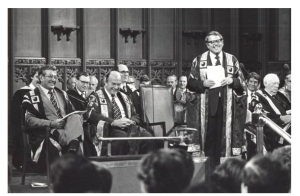50 objects for 50 years. No 36. The Briggs Building.
Monday, December 24th, 2018I work in a building named after Asa Briggs. It is on the OU’s Milton Keynes campus. But why was he significant to the OU?
Briggs, 1921-2016, was a member of the OU’s Planning Committee 1967 ─ 1969 and chair of its working group on students and curriculum. He recalled that
Harold Wilson’s original idea was to connect existing extra-mural departments, the Workers’ Educational Association [Asa Briggs was President of this body] broadcasters, correspondence courses and night classes together to create a scheme for degrees to be awarded by an established university. He did not initially envisage an institution with a charter and autonomy but a consortium of existing universities using television and the post, facilities for home study, nationally-organized correspondence teaching and a structure open to a variety of people.
Briggs addresses an OU Awards Ceremony.
Asa Briggs went on:
I was very keen that there should be some kind of gateway element, an introductory element into the courses … there should be some inter-disciplinary element and that there should be no great gap in the university between one set of courses and another. That there should be very considerable freedom to move from one course to another… that people should take as long as they liked to get their degrees. And I found all this extremely exciting… not a great deal of resistance on the Committee, but an immense amount of scepticism outside’.
Briggs also ‘believed very passionately and still do, in getting the access questions right.’ All these elements were introduced to the OU. Wilson’s ‘educational trust’ and Jennie Lee’s engagement with conventional wisdom were developed by Asa Briggs. As Ritchie Calder, a colleague of Asa Briggs on the Planning Committee said, ‘we stripped down the conventional university to its chassis and examined the essentials’.
Briggs taught modules at the OU. While the 1966 White Paper The University of the Air’ argued that OU programmes should bring ‘lecturers of distinction within easy reach of everyone’, the Planning Committee concluded that television ‘should not be wasted in the straightforward visualisation of lectures’. Asa Briggs took the opportunity to explore this idea. For the Arts Foundation Course, he presented a television programme, ‘Leeds: a study in civic pride’. Using film and music it is far more than a dry lecture to camera, or a travelogue. This is history which contextualises the level at which people lived their lives within broader regional, national and international perspectives so that those new to studying and with only one opportunity to watch the programme (this is before video playback machines were commonplace) could get a sense of why history is important and relevant to them and how it can be created by ordinary learners everywhere. Watching the programmes years after they were made you see both an expert enthusing about his subject and somebody who makes support for learning central and who wants to provide learners with opportunities to construct their own understandings, to be producers of knowledge as well as consumers of education. He also worked in some of the course teams. These comprised of academics, BBC producers and editors and created the teaching materials. He recalled that ‘sometimes I was on ones where I found myself in, to some extent, in disagreement with many other members of the same course team. But the idea of pulling together a group of people was important’.
As well as being an influential planner Briggs was Chancellor of the OU 1978 – 1994. He brought to the post his experience of work on the University Grants Committee and at the universities of Sussex and Leeds. He also used his Bconnections to well-established networks enabled him to help resolve disputes. Sir Keith Joseph, the Secretary of State for Education, 1981-1986 expressed concern at that which he considered bias in OU materials. The Vice Chancellor, John Horlock recalled being ‘summoned to what proved to be a very difficult interview’ with Joseph. He concluded: ‘I am sure that he [Joseph] would willingly have closed the OU down if it had been politically possible to do so, particularly after the affair of academic bias’. Asa Briggs was familiar with Keith Joseph ‘because I’d written a Nursing Report and when he was Secretary for Health’. When the Minister sought wanted advice about the best books on the history of his constituency in Leeds from the author of Victorian Cities the OU Chancellor used the opportunity to address ‘his fears and doubts of bias in Open University courses’.
